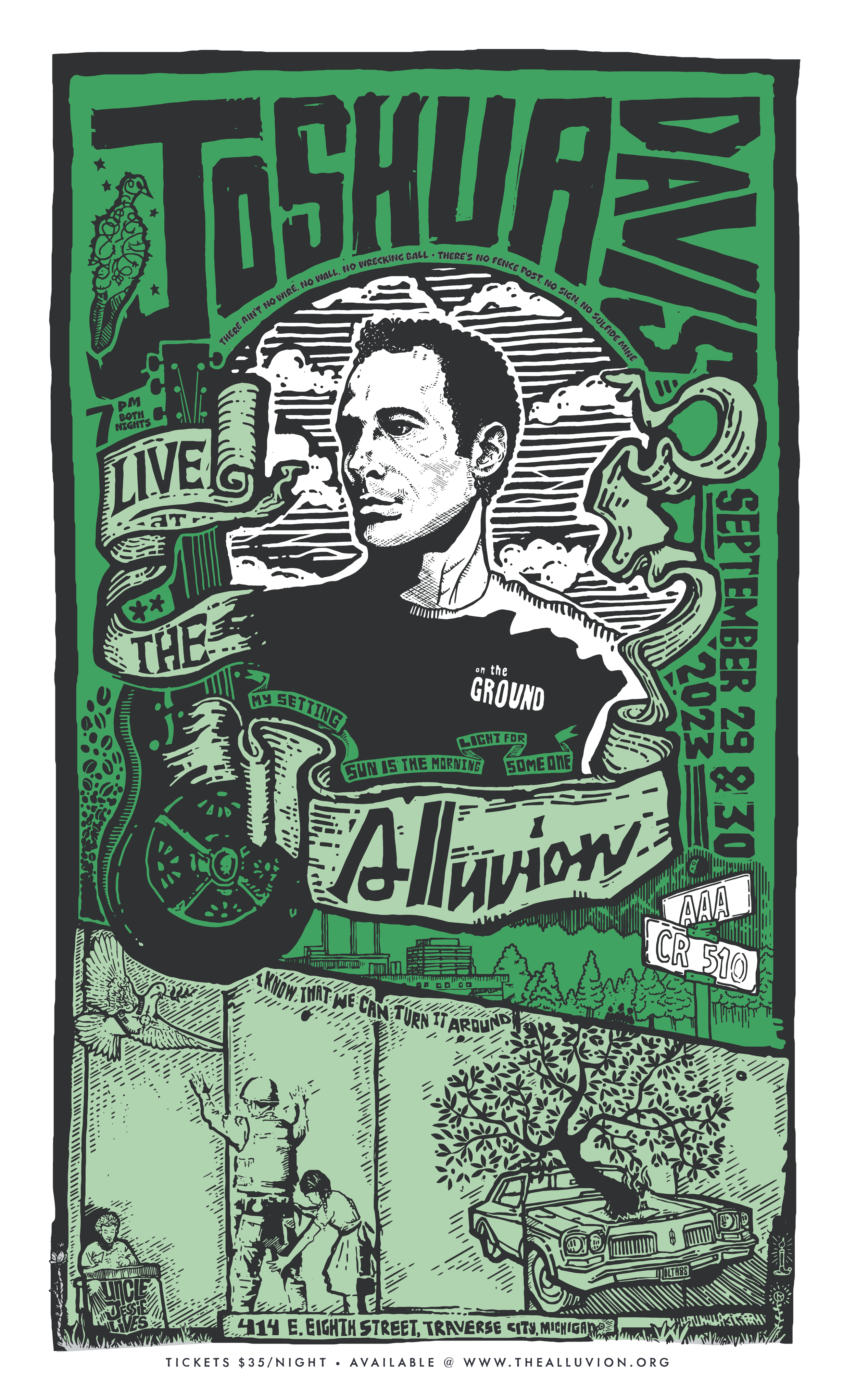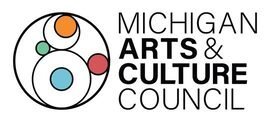The Whole Field • Volume 2 • No. 17 • Full Moon • September 5, 2023
Joshua Davis Live at the Alluvion • August 2023
Digital Image to be produced as screenprinted posters at Repeater Press, Marquette
Artist: Brad Kik
In This Issue: Describing the myriad mundane ways we fail each other, and how we can do better.
And, we still would like to know: what would you like to see in a rural innovation lab / maker space / education space / community hub? Make sure your ideas are included here.
Observe the Magnetic Field that Gathers all of our Betrayals
“…we make decisions all the time—countless times a day—about what we value, where to put our attention, what compromises are worth making and which are not, what matters—and all of these are driven by a story inside our head, a story that so often fails us when it comes to taking care of each other, a story that is made up, in part, of that magnetic field all three of these women describe.”
Part 4 of a series on shifting our culture toward ecological ways of being in the world.
You don’t need to read parts 1 2 or 3 to make sense of this, but if you prefer to go in order, start here.
All of us at Crosshatch were asked to reflect on our favorite moment of 2022 for our annual report. Here’s mine:
One of my favorite moments from 2022 was working with Teri VanHall on her session for the Northern Michigan Small Farm Conference. Her presentation, “Starting a Community Farm: Lessons from the Field”, touched on dozens of topics, including design systems, governance structures, and planting calendars — more than we could ever do in the 90-minute slot she was allotted. It was during her live session, though, that the theme underlying these ideas became clear: the structures of power on the farm often cause harm, particularly to women. We’ve since hired Teri to develop that theme into a longer series of presentations and workshops, which we hope to present in 2023.
(BTW: We’re making Teri’s 2022 sessions free to watch for the month of September.)
For every environmental hero or inspirational farmer blowing up as a celebrity, there are thousands out there quietly doing the work, for the sole reason that it’s the work they are called to do. That’s Teri. She’s a remarkable woman, dedicated to art, regenerative agriculture, community resilience, and other ways of building a world where humans can improve their relationship with each other and the land. As you can guess, work of this kind usually pays poorly-the expected trade off being that you get to work on fulfilling projects with amazing people. So when those experiences instead turn out to be abusive or exploitive, it cuts deeper, often driving people out of the work altogether.
But why? Why would organizations with such gorgeously compelling missions fall prey to these kinds of failures? Is this a bug in the system, or a feature? I’m going to argue that it’s a feature—not of small non-profits or other community projects, but of the larger culture. We can fix it.
I think Teri would agree with me, but first, she’s making me pause and revisit a gap in my thinking. Thanks a lot, Teri.
Teri and I email each other, often reflecting on the bigger-picture questions that we both wrestle with. In my last Whole Field essay, I wrote, “we can choose to allow our give and take with the living world to entangle us in myriad relationships with the other members of our place. These relationships protest being valued by economic means. You can’t buy your way out of a gift economy, you can only trade your way deeper in.”
Teri emailed me and said:
The flip side of this coin is that for those who don’t have the economic means, relationships become the foundation of life, and if/when the human elements of those relationships become leechy, parasitic, grossly unbalanced and/or anything less than some sort of reasonable fair-trade, it can be absolutely long-term devastating for those who were relying on reciprocity to hold the center through whatever challenges might develop.
Expendable income allows for degrees of choice, safety, comfort, freedom, progress, growth; whereas relationships take time and may not provide those benefits no matter how deeply one attempts to trade their way in.
I believe you were speaking to the non-human aspects of reciprocity here, which is of critical importance, but also somewhat empty if we’re not simultaneously working to restore reciprocity in our human relationships as well.
I know you already know this, just pointing out the both/and that always jumps out at me, similarly with BIPOC, LBGTQ+, and women, especially low-income women, as there are very few groups I’m aware of that advocate effectively for the latter and it’s rare to see the latter included in advocacy for the former, at least in my experience, and I’m always looking to see who’s included.
There’s so much here worth discussing, especially everything packed into that first sentence.
The Warp — Ideas and Inspiration
|| 1 || I’m LATE. It’s well-past the full moon, and this is the first issue that’s arrived late. That’s entirely on me (Brad) both because this essay was hard to pull from the ether onto the written page, and because I’ve been deep in the weeds with lots of other projects lately (see the graphic design piece above, for example). In a way, I feel like the lateness of the essay is part of the essay too—the earlier drafts included a lot more about self-care and slowing down, but those ideas had to make way and will finally find their home in the next one.
The next essay will arrive on time!
|| 2 || Teri’s thoughts came in response to a previous Whole Field essay, and quickly became the foundation for a new one. This is how this process works! These essays are a process of thinking out loud, and responses like hers (or yours) make it more of a conversation. One that I value.
Likewise, when I recently offered “If this is profoundly interesting to you too, let’s grab coffee,” Nurya Parish at Plainsong Farm and Ministry took me up on the offer. Our conversation was a delight, and ranged widely from non-profit shop talk to sharing origin stories, to cultivating plans for future work together. I’m looking forward to a visit to Plainsong soon.
All of which is to say—reach out. It can be a little lonely putting these stories out into the world, not knowing who they are reaching or what they think of them. Also, I miss the Artist Communities Alliance conferences with a deep pang. There’s really nothing better than dorking out with your people around the things you’re most passionate about.
|| 3 || Another part of the essay was going to focus more deeply on how we take care of each other—because that’s a magnetic field too* That part was going to feature my friend Seth Bernard. Seth is an artist and activist and co-founder of both Earthwork Music and Title Track. If you know Seth. you may have heard how he’s been hit hard by two concurrent blows—a misdiagnosis that led to extreme back pain and physical limitation, followed by a diagnoses of Lyme. As a musician, Seth depends on touring to make his income—so as happens to so many of us, he’s now both trying to rest and heal, and hugely worried about how he’s going to make rent and pay other bills.
Seth is not alone in this struggle, and many others who struggle with chronic illness or physical disability (short- or long-term) are not as well connected as Seth is. I have no doubt that our community will rally—a GoFundMe is on the way, for example—but it has me thinking about how we can bake this kind of belonging into our processes more often.
*Another way of talking about this is systems thinking.
|| 4 || We’re continuing the call for Land-Based Projects, even those in the most formative stages. If you or someone you know works on an outdoor festival, a skill-share, an eco-village, intentional community, public-facing farmstead, or any other project that connects people on and around the landscape, fill out this form. It’s quick.
Likewise, we’re interested in your ideas for a rural innovation hub aka maker-space aka community project on the land in Bellaire. Another quick survey. Fill them both out and I’ll buy you coffee.
I’d love to hear from you. What keeps you reading these essays and emails? What else can we offer? What would you like to dive deeper into? And do you want to write one for us? Or do you want to drink coffee and talk shop?
Let me know at brad@crosshatch.org. Thanks for hanging in there with me. Share this around with other friends deep in these rabbit-holes.
The Weft — News and Events
|| 1 || The 2nd annual Perennial Farm Ecosystem Conference is coming on September 8th in Leelanau County. Join the Leelanau Conservation District and partners to learn about a systems approach to growing perennial crops. Experts will discuss the importance of integrating native beneficial habitat for pollinators and soil invertebrates, how to improve soil health and its benefits, the impact of alley vegetation management, and the value of sap analysis for nutrient balance. $25
|| 2 || The Artist Communities Alliance is hosting a Field Conversation on Thursday, September 14th. Called There is No Safety Net: Protections, Relief, and Advocacy. Artists and cultural workers who have been historically under-resourced in areas of pay, protections and direct support are more vulnerable than ever. In a world where the language to provide context is contested and in some places criminalized, ACA's President and CEO, Lisa Funderburke, will host a timely conversation with advocates and program administrators to explore innovative and practical ways to strengthen support for artists and cultural workers.
|| 3 || The new Antrim County Writers’ Project is bringing the poet Keith Taylor, to Bellaire and Elk Rapids for two events.
October 24 @ 7 pm — Keith Taylor’s Reading and Book Discussion of The Bird-while
October 25 @ 2:30 pm — Keith Taylor Poetry Writing Workshop
|| 4 || Our friends at the Good Hart Artist Residency are celebrating 10-years of supporting artists. I can’t believe it’s been that long. Join them on Saturday, September 16th, at 5:30 pm at the Crooked Tree Arts Center in Petoskey for a party and the opening of a new show: Art + Place + Community: 10 Years with Good Hart Artist Residency
sponsored by:
Desmond Liggett Wealth Advisors is a mission-driven, fee-only wealth management company with a simple purpose: to generate exceptional value for the individuals, families, small business owners, and non-profit organizations they serve. Desmond Liggett Wealth Advisors believe in and adhere to triple-bottom-line analysis for portfolio investments, ensuring that they review how a company’s environmental and social values impact its long-term resilience and, consequently, value.
Many thanks to the Michigan Arts & Culture Council and the National Endowment for the Arts for their support of this work.
Crosshatch’s The Whole Field is a biweekly newsletter. We aim to provide content that’s engaging, thought-provoking, and worth your time. If you’ve been forwarded this email, and want to receive future editions, click here to subscribe to our mailing list or view previous editions.
We also envision this best as a collaborative work. If you have any suggestions, leads or feedback, we appreciate your reply directly to this email.
Copyright (C) 2023 Crosshatch. All rights reserved.










